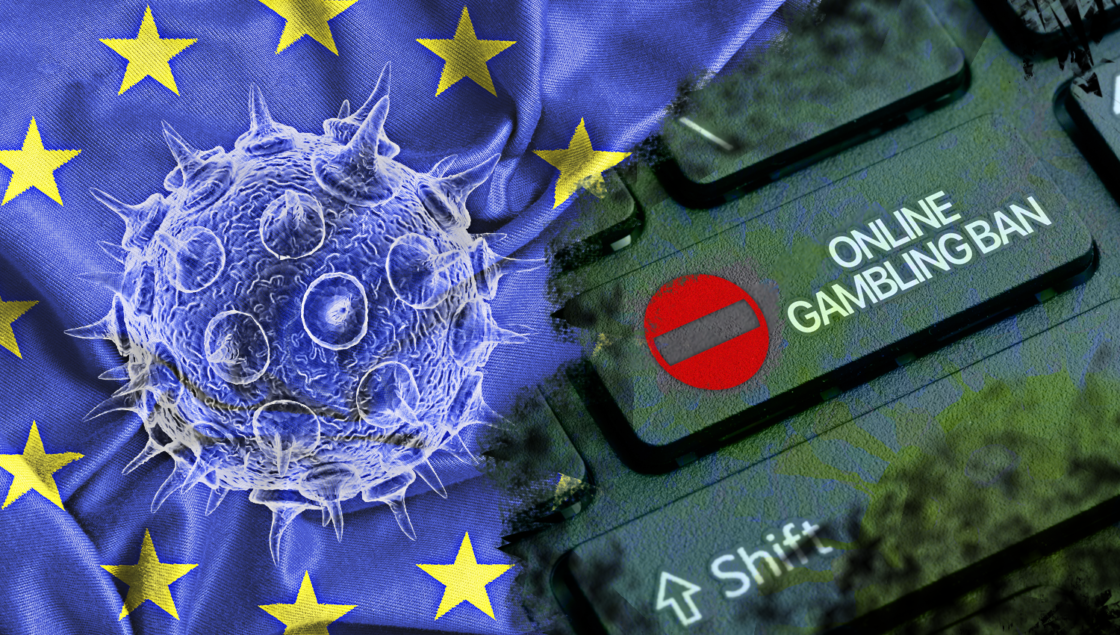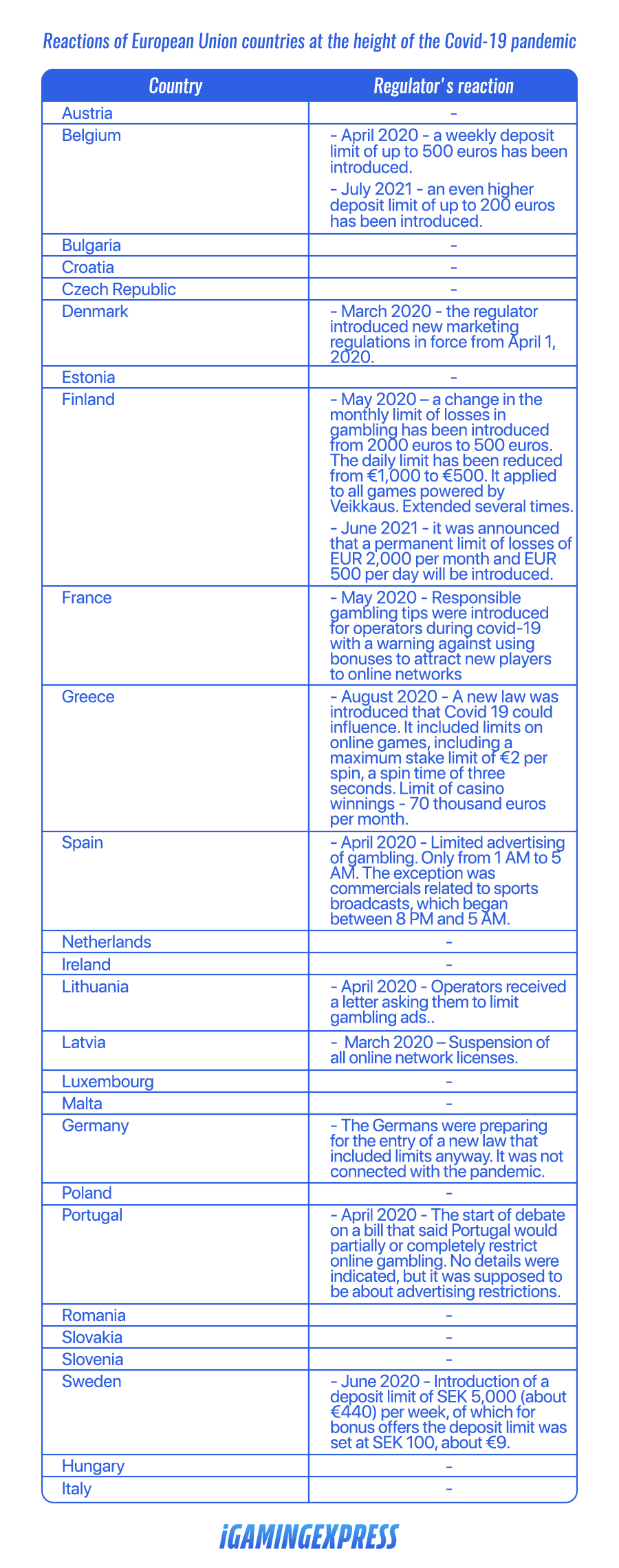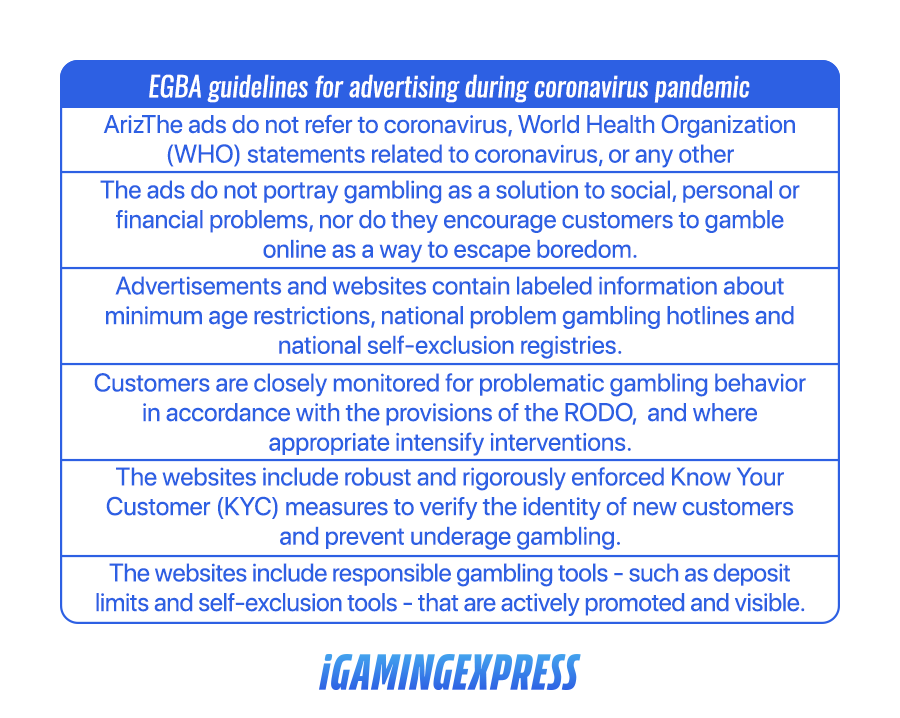Wild West 2.0. A story about mistakes made by European regulators during the Covid-19 pandemic

Wild West 2.0 – that’s how one can describe the chaos that ruled the European gambling markets between March and June 2020. Indeed, experts rightly predicted that companies that year, and the following year, would suffer significant financial losses due to the pandemic crisis, and regulators in an unconscious way instead of helping them to survive, strengthened companies operating in the grey economy. Many decisions were made under the influence of the moment, which turned against legitimate businesses. Of course, it is difficult to deny that actions of the politicians were totally unnecessary, but for sure it should be more thoughtful and consulted with the industry. Indeed, their effect was not to protect players more, but to strengthen and give opportunities to offshore bookmakers.
Accelerated growth of online market
With the onset of the pandemic, almost all European countries decided to close stationary bookmakers, casinos, slot parlors, or bingo halls. In fact, in the middle of March, going to such a place in any European country was impossible. This is evidenced by the fact that Italy, which was one of the countries most affected by the pandemic, closed its facilities 10 March 2020, which was still one of the latest dates.
Openings of locations in the retail network in European countries took place in May/June 2020. By then, everyone was working out a plan for the return, which, in the case of the aforementioned Italy, did not take place until June 12, which, relatively speaking, can still be considered a quick resumption of operations. Of course, it was connected with the return of Serie A, or the Italian Cup. The situation was analogous to these in other countries.
Simply reopening, however, did not mean a return to the old times. First of all, all gambling outlets could only be opened if they met certain security rules. Depending on the country, these were more or less restrictive. The increased safety rules mainly involved providing employees/customers with protective masks, as well as painting signs on the floors indicating social distance. Moreover, dispensers with disinfectant liquid had to be placed in all locations, and customers had their temperature measured before entering the outlets. It sounds like an abstraction now, but it was so at the time, which, of course, meant that customers did not visit their favorite outlets as often as they did before the pandemic.
All of this caused that the online market became even more important, as evidenced by data prepared by the European Gaming and Betting Association (EGBA) in cooperation with H2 Gambling Capital at the end of December 2020. Indeed, online gambling revenues in Europe grew by 7% – from €24.5 billion GGR in 2019 to €26.3 billion in 2020. This result was extremely satisfactory, as revenues from the online gaming sector declined significantly in the second quarter of that year.
Thus, the online sector gained momentum in 2020, and it should be remembered that it was already on an upward trend before the pandemic began anyway. It is for this reason that many national regulators have decided to react in the worst possible way by imposing new regulations on the online market. In their opinion, this was to protect players from gambling addiction, to which they were said to be particularly more exposed, than before the pandemic.

Intervention of European Gaming and Betting Association. Wasn’t it too late?
Mid-June 2020 the first official communication from the Secretary General of the European Gaming and Betting Association, Maarten Haijer, appeared.
 Secretary General of the European Gaming and Betting Association, Maarten Haijer
Secretary General of the European Gaming and Betting Association, Maarten Haijer
Haijer pointed out that measures taken in several countries, such as deposit limits imposed on players in Belgium, were not supported by in-depth analysis, resulting in an increase in the market share of grey economy operators. Indeed, governments in some countries expected that with the coronavirus pandemic, the share of online gambling would rise to the extreme, but data published by the European Gaming and Betting Association showed that this was not the case whether or not anyone implemented restrictions.
Politicians meant well, but they didn’t understand the industry
Maarten Haijer had no doubt that politicians meant well when introducing restrictions, but unfortunately the orders were not well thought out: – We think that most of the restrictions, designed to protect citizens, were introduced with good intentions. Politicians want to protect their citizens, but most of the implemented restrictions were not supported by the facts. Thus, the restrictions may have done more harm than good. Unfortunately, imposing new restrictions on licensed operators does not apply to illegal ones. What’s more, grey economy companies always take advantage of such opportunities.
– Operators in the grey zone have no obligations toward the state and their customers. They do not keep registers of self-exclusion and do not pay taxes. We can’t let them grow– concluded then Secretary General of the European Gaming and Betting Association, Maarten Haijer.
Domestic regulators unintentionally strengthened the grey economy
Of course, it is impossible in this case to reach for specific and uniform data for all European countries. Especially since we are talking about a conventional period of time when the pandemic was at its peak. First of all, the lockdown, in which traditional facilities were closed, ended on a different date in each country. Unfortunately, this permanent chaos has been music to the ears of many domestic regulators, who have had an excuse to impose further bans without proper analysis. In the case of the introduction of increasingly absurd limits, it has always – no matter in which country – been cited as an argument that due to the fact of lockdown, players have more time to play online, and this is dangerous for them. However, various data from individual markets show that such a danger has never existed.
In Belgium, for example, a weekly deposit limit of €500 on all licensed websites was introduced in April 2020. It applied to all players. This then led to a decrease in player activity by as much as 38%. Denmark, on the other hand, which did not impose restrictions on rates, experienced a 60% drop in online site activity. Of course, this also resulted in financial performance, as online sports betting revenues in the country fell 19.6% to DKK 1.01 billion between March and June.
– The significant decline in online gambling, in many countries that have imposed no restrictions at all, is contrary to what many governments had predicted. Thus, this calls into question the introduction of additional restrictions and limits on deposits. To put it more roughly, one-size-fits-all restrictions, such as ad blocking or general deposit limits, are not aimed at protecting players at risk of gambling addiction. What’s more, it may even induce them to play with illegal operators who completely fail to protect players. So there is more harm in this than good – Maarten Haijer said more and more distinctly.
Of course, it didn’t take long for other major European markets to confirm the words of the Secretary General of the European Gaming and Betting Association. Indeed, the UK Gambling Commission concluded that 67% of citizens did not gamble during the peak of the coronavirus pandemic.
Swedish misunderstanding
The situation was even different in Sweden, where online activity also dropped during the peak of the pandemic. In the case of this northern European country, the reference is to a 6% decline between March and June, when the pandemic was at its peak. At the time, back in April, the Swedish regulator proposed introducing rate limits, which was met with solidarity opposition from all major players in the market. In June, however, the Swedish Ministry of Finance announced a set of further measures to be introduced in the next few weeks. First of all, we’re talking about limited deposits in casino games and online slots to $545 per week. Players were also supposed to set time limits.
Once again, this met with immediate and rightful opposition from the Swedish industry, and an alternative was given. Indeed, the nine CEOs of Sweden’s major gambling operators have proposed changes to laws on player protection.
In the aforementioned statement coordinated by the operators’ association Branscheforenigen för Onlienspel (BOS), the heads of companies such as William Hill, Kindred Group and Betsson presented seven key requirements that, according to them, will provide players with a more secure entertainment experience. The appeal was supported by NetEnt, LeoVegas, ComeOn, Videolots, Hero Gaming, and Suprnation. Branscheforenigen för Onlienspel noted at the same time that the new restrictions on casino stakes could result in fewer players betting at legitimate online casinos. Such a situation could even lead to half of the money staked by Swedish citizens at online casinos being transferred to illegal operators.
 BOS Secretary General, Gustaf Hoffstedt
BOS Secretary General, Gustaf Hoffstedt
– As an industry, we have a lot of doubts when it comes to building a game market in Sweden. We have collected all the ideas in one letter. I would also like to emphasize that, unlike the government, our ideas do not move players away from licensed operators– said BOS Secretary General, Gustaf Hoffstedt.
In its letter, the BOS also urged for greater promotion of the self-healing registry, and called for a change in regulations regarding data storage: – The online gambling industry collects and processes large amounts of data on customers’ gambling behavior. The Ministry of Finance should instruct the Swedish Gambling Authority to demand regular reports from operators to note repeated “worrying” customer behavior. This will help the Gambling Authority better understand the problem it is fighting. Operators have such data and are willing to provide it in such a way that customer anonymity is not violated.
– There have been great advances in machine learning and artificial intelligence. Computers are able to process huge amounts of data and identify patterns required to better understand and provide a basis for good decision-making. The gambling industry is also making progress in this area and sees great opportunities to improve our ability to detect and stop harmful phenomena such as gambling, match-fixing and money laundering. We therefore appeal to the Ministry of Finance, which has an excellent opportunity to undertake strategic cooperation in this area with authorities, researchers, as well as the gambling industry and gambling addicts– we read further in the appeal.
Finally, the Swedish regulator stood its ground and in June 2020 introduced deposit limits of SEK5,000 (about $480), of which for bonus offers the deposit limit was set at SEK100, it means about $10! Swedish Minister of Health and Social Affairs, Ardalan Shekarabi, at a press conference explained his decision clearly: – The pandemic creates dangerous circumstances that may increase the risk of gambling addiction.
Initially, the limits were to be introduced by the end of 2020, but the decision was later extended regardless of the fact that the Covid-19 pandemic had significantly weakened and the lockdown ended. It was not until the end of January 2022 that the Swedish government announced that it did not intend to continue the previously proposed restrictions on online casinos, which were to take effect on February 7.
Of course, such a decision was welcomed by the BOS. However, it was not without a pin aimed at the regulator: – This is a wise and balanced decision by the government, as the pandemic has weakened and, moreover, previous regulations have not achieved their goal. We are for market regulation, but one that can have the intended effect of protecting players. The Covid restrictions were by no means such, so we accept their withdrawal and we are happy about it– said Gustaf Hoffstedt.
Latvian madness
The Latvian government went even further, deciding to suspend the licenses of all operators for almost a month (from March 24 to April 14, 2020) due to the spreading coronavirus pandemic. Interestingly, this case involved both licenses to accept bets through the retail, and online sectors.
At the time, the Latvian government imposed regulations aimed at reducing the further spread of the COVID-19 coronavirus. The measures taken included a ban on all activities in casinos, bingo and slot parlors, or traditional bookmaking outlets, which were ordered to cease operations until at least April 14, 2022.
As originally written, the legislation to close the gambling sphere only applied to traditional establishments. At the time, however, some politicians concluded that quarantined citizens would abuse online gambling. This led to a second vote, in which it was decided by a score of 37 – 22 to ban online gambling as well.
The event came at a time when Latvia’s online gambling operators have so far posted a record year, as their revenues year-on-year increased by about 30%. Casino games and sports betting were the main contributors. Obviously, the Latvian government’s new regulation has negatively affected the performance of legitimate operators and, according to unofficial data, significantly strengthened the grey economy. It is unofficially said that 70% of players who previously played in legal companies moved to illegal operators at the time. Certainly, many of them never returned to play with legitimate companies again.
Is Portugal an example of good crisis management?
During the pandemic, Portugal was given as an example of a country where the pandemic took a gambling toll. They published, among other things, data according to which before the pandemic about 15 million euros were spent there daily on games of chance, and during the lockdown over 25 million euros. According to the Santa Casa da Misericordia and Lisbon’s state Office of Gaming Regulation and Control (SPIJ), the phenomenon could be related to increased sanitary restrictions since March 2020, as well as citizens were staying at home longer than before.
– Although casinos and collectors were closed in our area for a while, gamblers have switched to the Internet, where there is no shortage of betting opportunities -said senior of Benfica district, Maria Azevedo.
Of course, as it later turned out, the alarm was too early, as the growth of the online sector was natural. – We can conclude that the closure of the casinos contributed to a significant increase in the corresponding growth of online gambling, which has gradually stabilized, approaching its pre-pandemic value. This creates a new reality, as players, despite the fact that they loved to play at traditional outlets, were able to move online when the need arose- one could read in an August statement from the Portuguese sector.
In April, however, the Portuguese parliament called on operators to “partially or completely restrict access to online gambling platforms.” It was added that the most vulnerable in society, as well as minors, should be protected. The bill presented by members of the Partido das Pessoas, dos Animais e da Natureza (PAN) – did not specify the details of the required restrictions. Spain, where regulations have been imposed on gambling advertisements, was cited as an example. During the pandemic, they could only be displayed (with limited exceptions) between 01:00 and 05:00 at night, which, of course, meant that they had no impact on player acquisition.
Finally, however, the Portuguese regulator kept its sense and did not introduce new regulations overnight without consultation with the industry. The topic was subject to additional debates, and eventually 919 Law – on advertising restrictions – was voted on in July 2021. In a brief statement, it says that gambling should be treated similarly to alcohol advertising. Thus, the broadcast of gambling advertisements from 7:00 am to 10:30 pm has been banned.
In conclusion, thanks to the rational approach of the Portuguese regulator, who kept a cool head and did not introduce ill-considered rate limits, the legal online market has gained momentum. Indeed, in the first half of 2020, Portuguese online operators generated revenues of €138.9 million, up 44.2% year-on-year. Interestingly, the increase was not long-lasting, as June’s or July’s was much lower. Indeed, some people returned to play at the traditional points when they opened. The lockdown of several months therefore in no way affected the fact that people began to allocate more resources to gambling. Most importantly, however, players did not migrate to illegal operators.
How covid-19 became a friend of grey economy operators
The time of the pandemic was a surprise for every industry. We do not deny that there were problems with this, as well as potential risks that needed to be countered. After all, the safety and well-being of the general public should always be of the highest priority. That’s why in that particularly alarming time for citizens of European countries and beyond, online gambling companies should act in a socially responsible manner. Their task was to ensure that players who choose to gamble online continue to do so in a safe environment. It is well known that only legitimate operators could guarantee a safe environment.
Restrictions therefore had to be fast-tracked, but only in areas that could actually change players’ attitudes toward entertainment in the context of the Covid-19 pandemic. One such area was gambling advertising. In this case, EGBA very quickly (March 30, 2020) published guidelines to be followed at that time:

– The reintroduction of coronavirus restrictions raises serious challenges for European society. These guidelines are designed to help citizens and give gambling companies the opportunity to demonstrate their willingness to take responsibility in these difficult times. These are simple but necessary measures that all gambling companies should adopt to protect their customers, step up their social responsibility efforts and ensure that their advertising is conducted in an ethical and responsible manner. We thus call on all online gambling companies to comply with them – said Maarten Haijer, Secretary General (EGBA).
When EGBA repeated its call seven months later (October 14, 2022) it was already clear that the European industry was right during the peak national lockdown (March-June 2020 – editor’s note) to keep a cool head and not hastily introduce limits on stakes, deposits, or bonuses. Despite concerns, income from online gambling, in fact, dropped significantly in Europe during the blockade between March and May, according to official government reports. Moreover, according to data published by gambling regulators, it is known that with the cancellation of major sports events, most sports betting customers simply stopped betting altogether and did not significantly shift to other forms of online gambling. In any case, at least with legal operators, because unfortunately the data published by regulators, as well as EGBA, did not take into account the growth of the grey economy in countries that immediately introduced various types of limits.
Worst of all, many players who emigrated to grey market operators at the time, even after restrictions were removed, did not return to legitimate companies. This has also had another negative effect on player protection, as many people were playing with one or two operators before the limits were introduced. When it was decided overnight to regulate top-down weekly deposit limits, as was the case in Sweden, players created more accounts with other companies. In such a case, it is difficult to control a player who may have a gambling problem, as he may spend relatively small amounts at one operator, but when he does it at ten, the amount becomes high.
– When gambling becomes as fragmented as it is with deposit limits, no single gambling company is able to capture risky gaming behavior and thus the basis of Swedish consumer protection in gaming law is lost. We call on the government to rethink and protect consumers in the Swedish gaming market – Gustaf Hoffstedt , secretary general of BOS, said during the pandemic,
In summary, if we consider all European online gambling markets, pandemic time is without any doubt the biggest regulatory failure in the 21st century. Even the phrase used by Swedish operators about “Wild West 2.0” is not an exaggerated statement. One can only hope that most regulators and, consequently, politicians have learned the lesson of 2020, as a lack of knowledge of the industry may lead to the strengthening of the grey economy. Chaotic regulations introduced “for yesterday” will never have a positive effect.

